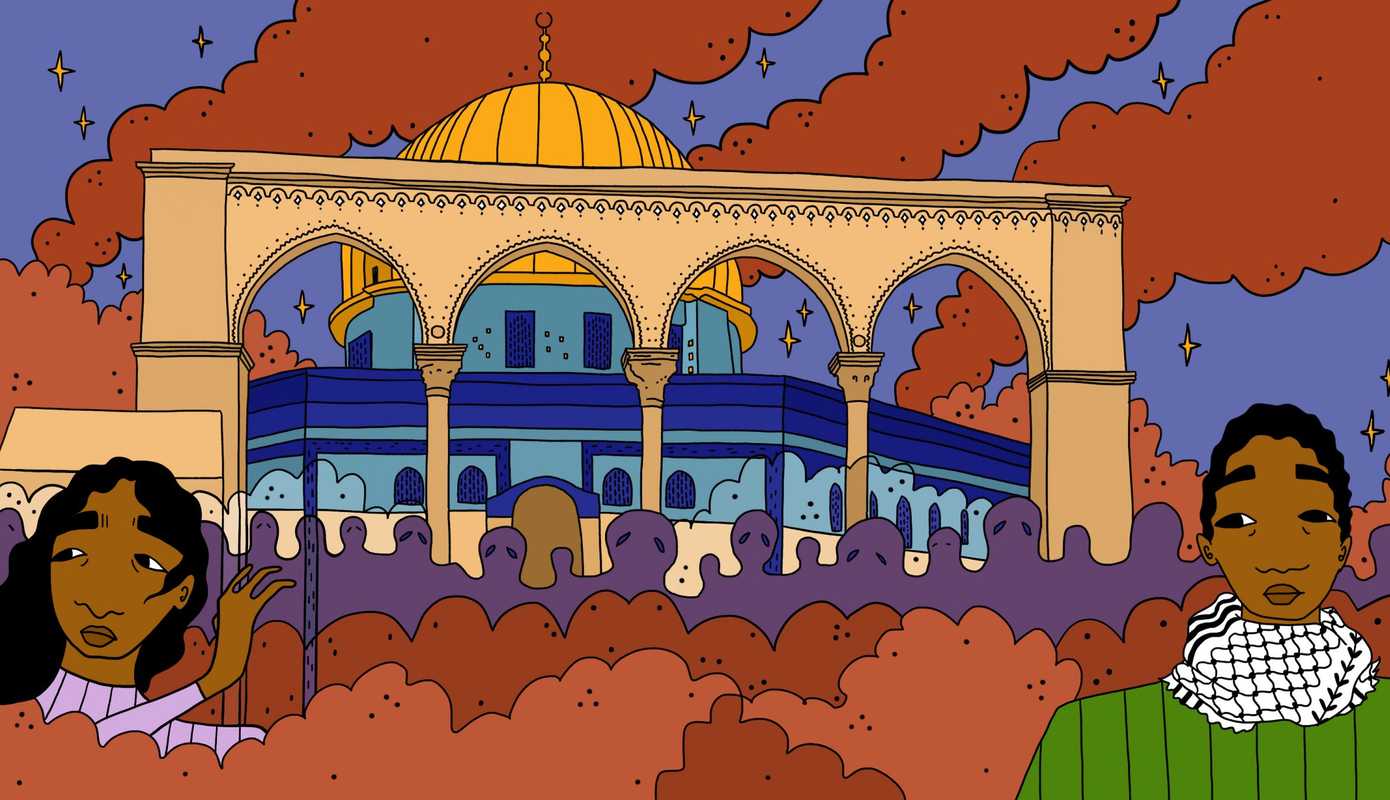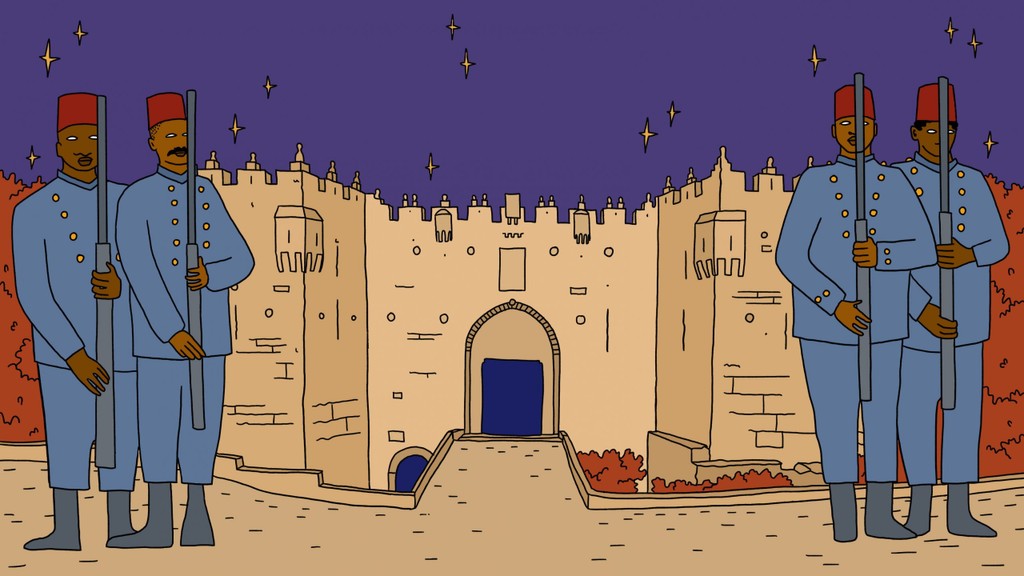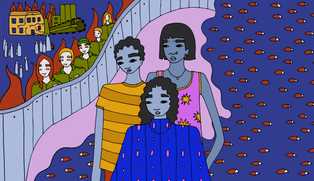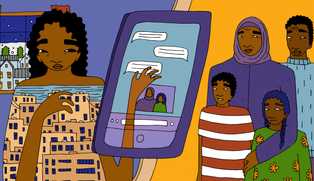This article is part of PALESTINE: WAYS OF BEING, a season centring under-explored areas of Palestinian life and liberation.
On 7th June 2022, Afro-Palestinians of the Old City of Jerusalem rejoiced; their brother Mohammad Firawi was finally coming home.
It had been five long years since Firawi – then a twelfth grader in the middle of school exams – was accused of throwing stones at Israeli police, taken away from his home and shuttled around nine Israeli prisons. Now aged 25, he was ready to be back in the African Quarter, and they were ready to welcome him.
The community’s joy was interrupted, however, when two days later, Israeli intelligence re-arrested and expelled Firawi from Jerusalem for a week. Their reason? That he “defied Israeli orders to refrain from celebrating [his release].” Re-arrest is common practice after prisoners’ release, for reasons as impossible to justify as they are to fight. When one’s existence is made a crime, even moments of joy are closely monitored and policed.
“[The] Israeli occupation wants to prohibit any expression of happiness in the community,” Firawi tells Skin Deep, “even adopting the policy of prohibiting any symbols resembling Palestinian identity, including the Palestinian flag. They fight anything they believe negates their alleged sovereignty in Jerusalem.”
The Afro-Palestinian community resides in the African Quarter in the heart of the Old City of Jerusalem just outside Bab al-Majless, the main gate of al-Aqsa Mosque. The neighbourhood comprises a pair of twelfth-century ribats – building complexes originally erected to house pilgrims to the city – which stand on either side of Ala’ Eldin, a street lined with stores selling religious books and Islamic clothing. Since 2015, Israeli police checkpoints have flanked both entrances of Ala’ Eldin. Passersby are interrogated about whether they are Muslim, or whether they have permission to be present in Jerusalem, and are often issued orders denying them entry to the Mosque. Sometimes, Israeli police also ban food for fasting people, and even construction materials for the Mosque. It all depends on the mood of the officer in charge.
It is a very specific experience, existing both as an overlooked part of a city’s history, and as a persecuted community within a persecuted community. During the Ottoman era, Africans worked as custodians and guards of al-Aqsa Mosque – their role was to prohibit non-Muslims accessing the premises of Al-Haram Al-Sharif, the Noble Sanctuary and third holiest site in Islam. Many of them were Muslim immigrants from Chad, Sudan, Nigeria and Senegal who settled in Jerusalem in the nineteenth century after performing the pilgrimage to Mecca. After the outbreak of the Arab Revolt against the Turks in 1914, 36 families living in the African Quarter were evicted and the two ribats – Ribat Ala’ El-Din al-Buseiri and Ribat Al-Mansour – were converted into prisons to hold activists taking part in the revolt. When the British occupied Jerusalem in 1917, the prisons were shut down and the Islamic Waqf (the association in charge of Muslim properties) leased the buildings back to the Afro-Palestinian community.
“My family have been in the Old City since 1922,” says Mahmoud Jaddeh. “My father first moved to Jerusalem from the village Twe in Chad, after performing the pilgrimage to Mecca to obtain the title of Haj Maqdessi [a Muslim who performs the pilgrimage to Mecca and Jerusalem].”
Any holder of this title would receive high social status back home, but Jaddeh’s father chose to stay in the Old City to defend it against Zionist ambitions.
“Nobody can remain silent when seeing the city in which he was born and lives being occupied by foreign forces”
Jaddeh was born in 1949 during a defining period in the history of Palestinian disenfranchisement, and from an early age he recognised his freedom as something he needed to fight for. After Israel occupied Jerusalem in 1967, Jaddeh’s generation of Afro-Palestinians took up their forebears’ fight and joined in the struggle against the occupation. Jaddeh was only nineteen when the Israeli state arrested him together with his cousin Ali in 1968. His brother, Abdullah, was among four other members of the community who were deported to Jordan the same year. Jaddeh was sentenced to 25 years while his cousin Ali was sentenced to 20, but both were released in 1985 as part of a prisoner swap (the Jibril Agreement, during which Israel released 1,150 Palestinian prisoners in exchange for three Israeli soldiers who were captured by Palestinians in Lebanon).
“I was in Israeli prisons for 17 years,” Jaddeh says. “My father died during that time, and when I was finally released, so much had changed. The iron plates that formed part of my house had been replaced with stone bricks. Two brothers-in-law were living there. At the time, I found it very difficult to recognize the new generations of the African community who were born while I was serving my term in prison.” And still, even as Jaddeh struggled to adjust to all that was now unfamiliar, he could see that the injustices he had been imprisoned for resisting all those years ago were as present as ever.
Jaddeh recalls an attack on 29th September 2000, by the Israeli police on Palestinian demonstrators in the yards of al-Aqsa Mosque. Palestinians were protesting against the notorious visit of the late Israeli Premier Ariel Sharon, a visit which sparked the second intifada. Jaddeh’s 23-year-old nephew Osama, on his way to donate blood for those injured during attacks, was shot dead by Israeli police outside al-Makassed Hospital.
Now in his seventies, Jaddeh provides self-described “authentic tourism” trips, challenging the Israeli regime’s version of the history of Jerusalem. “Nobody can remain silent when seeing the city in which he was born and lives being occupied by foreign forces,” he says.
Jewish settlers hold a flag march in Jerusalem every year to celebrate taking control of the city in 1967. During the march earlier this year, Jaddeh heard a story from a Norwegian tourist he was guiding.
“He heard Jewish right-wing fanatics shouting: ‘Death to Arabs, death to Shireen [referencing Shireen Abu Akleh, an Al Jazeera correspondent, who was shot and killed by Israeli soldiers in Jenin in May 2022], Mohammad [the Prophet] is a pig…” recounts Jaddeh. “[He] was astonished by what he saw.”
“The occupation is not eternal… sooner or later, we will regain our freedom”
During the march, Israeli police will usually order Palestinian stores to shut down and prevent any Palestinians from walking on the march route. In other words, it is like a curfew. During such marches, settlers attack Palestinians and their properties, and if any person tries to defend himself and hit back, he’ll likely be arrested and banned from entering the Old City for one or two weeks.
Firawi also recalls the march that astonished the Norwegian tourists, and the astounding number of Israeli security agents accompanying them. “They were there marching, as well,” Firawi says. “The occupation tries to impose its alleged sovereignty on the city by targeting Muslim and Christian holy sites,” he continues. For him, such marches are evidence that they have no sovereignty at all.
Challenging the occupation and its racism, whilst living in the middle of one of its hotspots, isn’t an easy feat. Shaden Qous, a second-year law student at Birzeit University in the West Bank, was born in the Old City in 2002. Her father and uncles have served several terms in Israeli prisons, particularly during the first Palestinian Intifada in 1987.
“For as long as I’ve been in school, I have been very active in solidarity demonstrations with Palestinian political prisoners, particularly during their hunger strikes to demand improving their conditions in prisons,” Qous says.
“Israeli forces do not treat the Afro-Palestinian community with humanity,” she continues. “[They] refer to us with the term Koshi [Hebrew for ‘Negro’], while the local Palestinian community calls me Samra [Arabic for ‘Dark woman’]. I am always reminded of my colour and that I am different.”
Devoted to the Palestinian cause, Qous finds solace in teaching folkloric dance to local teenagers. She loves dabke, the Palestinian traditional dance usually performed with folkloric music and songs hailing national Palestinian identity, resistance to occupiers, and longing for freedom. Each movement symbolises something significant in our culture, such as adherence to the land (farming, ploughing and harvesting), belonging to the community, love, and so on.
“It is a form of rejecting the occupation and preserving our national heritage. Every movement, word and song in our performance reflects a notion of our national identity,” says Qous.
She combines Palestinian and African dance movements “to always remember our roots that go back to the African continent.” During the COVID-19 lockdown, she trained community members to dance to Jerusalema Song by the South African singer Nomcebo Zikode, to release their stress in times of isolation and quarantine.
Afro-Palestinians work to keep both their heritages alive, learning from the experiences of their ancestors who settled in Jerusalem. They preserve the African custom of collecting money from members of the community to help each other during weddings and funerals. They occasionally gather to have traditional food such as asida, a porridge made of semolina and dried akra. And to organise themselves, Afro-Palestinians established the African Community Society (ACS) in 1983, an offshoot of the Sudanese Welfare Club, an organisation that was active in the fifties, but closed its doors after the Israeli occupation of Jerusalem. ACS’s activities empower women, children and youth of Jerusalem in addition to promoting the Old City. ACS also networks with local and foreign NGOs of the same thinking. It refuses to receive any donations that are conditioned on renouncing Palestinians’ struggle against Israeli Zionist occupation.
“ACS is very important for those of us on the margins,” says Qous. “It is a way for us to organise. The current Israeli right-wing government is responsible for the atrocities against the Palestinian people, but I am very critical of the current Palestinian leadership for its shortcomings in protecting the interests of the people. ACS gives us hope.”
After finishing her studies, Quos plans to dedicate time to defending Palestinian political prisoners.
“The occupation is not eternal,” she says. “As long as we continue to adhere to our national rights and believe in the justice of our cause, sooner or later, we will regain our freedom. We are not living on the margin of history. Our generation is aware of its cause and very well educated.”
“Happiness is not liable for confiscation or denial,” says Firawi. “We will continue to express our rejection of oppression, just by existing. [We will] achieve our genuine happiness after attaining our freedom and liberation from occupation.”
*
At Skin Deep, we make space for Black creatives and creatives of colour to tell radical stories that help usher just new worlds into being. We are a non-profit community interest company and funding is a constant struggle, particularly for some of the issues we believe are the most urgently deserving of our care and attention – like Palestinian liberation. If you believe in the importance of stories like the ones in this season, please support our organisation: become a member, or make a one-off donation.
*
A note on language: Throughout this season we use the terms ‘settler colonialism’ and ‘apartheid’ in reference to Israel. These terms are not employed solely for creative or descriptive purposes, but have a clear basis in international law and are supported by academic publications and leading human rights organisations. These frameworks encourage us to move away from the defunct ‘two state’ model which is predicated on partition and ethno-religious separation of people. Justice and freedom lie at the heart of our work and we have been listening to Palestinian thinkers and scholars who imagine their future as a decolonial one, where decolonisation means the repatriation of indigenous land and life. In order to further this vision, it is important to use accurate and detailed language which reflects the reality on the ground.
Further reading on these terms and ideas:
Abdo, Nahla and Yuval-Davis, Nira (1995), ‘Palestine, Israel and the Zionist Settler Project’, in D. Stasiulis, and N. Yuval-Davis (eds), Unsettling Settler Societies: Articulations of Gender, Race, Ethnicity and Class, SAGE.
Jabary Salamanca, Omar, Mezna Qato, Kareem Rabie & Sobhi Samour (2012) Past is Present: Settler Colonialism in Palestine, Settler Colonial Studies, 2 (1): 1-8.
Said, Edward (1979). Zionism from the Standpoint of Its Victims. Social Text, (1), 7-58.
Veracini, Lorenzo (2006) Israel and Settler Society, Pluto Press.
Ilan Pappe, “Zionism as Colonialism: A comparative view of Diluted Colonialism in Asia and Africa” South Atlantic Quarterly (2008) 107 (4): 611–633.
Jong, Anne de. “Zionist Hegemony, the Settler Colonial Conquest of Palestine and the Problem with Conflict: A Critical Genealogy of the Notion of Binary Conflict.” Settler Colonial Studies 8, no. 3 (2018/07/03 2018): 364-83. https://doi.org/10.1080/2201473X.2017.1321171.
Kauanui, J Kēhaulani. “‘A Structure, Not an Event’: Settler Colonialism and Enduring Indigeneity.” Lateral 5, no. 1 (2016): 5-1.
Tuck, Eve, and K Wayne Yang. “Decolonization Is Not a Metaphor.” Decolonization: Indigeneity, education & society 1, no. 1 (2012).
Patrick Wolfe. “Settler Colonialism and the Elimination of the Native.” Journal of Genocide Research 8, no. 4 (2006/12/01 2006): 387-409. https://doi.org/10.1080/14623520601056240.











